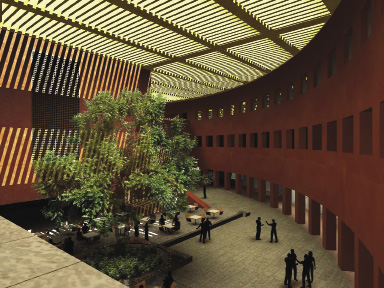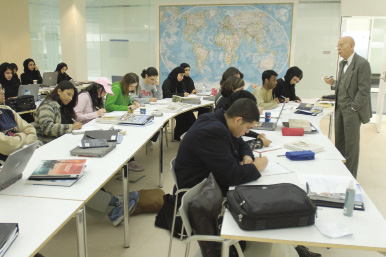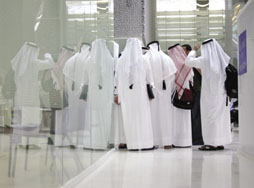


![]()
ONLINE
Empowering the Qatari People
Editors’ Note
Dr. Mohamed Fathy Saoud was appointed to his current post in November 2007 and has been a member of the board of directors since 2003. He previously served as Higher Education Advisor from 1997 to 2007, where he participated in the planning and development of Education City, one of the largest projects of Qatar Foundation. Before this, in 1978, Dr. Fathy joined the newly established Qatar University, where he became the founding Dean of Science. He started his academic career as Senior Lecturer, Assistant Professor, Associate Professor, and Professor of Parasitology at Ain Shams University in Egypt and the University of Khartoum in Sudan. An Egyptian citizen, Dr. Fathy graduated in 1959 from Ain Shams University in Cairo, Egypt, with an honors degree and earned a PhD from the London School of Tropical Medicine, London University in 1965.
Company Brief
Qatar Foundation for Education, Science and Community Development is a private, chartered, nonprofit organization founded in 1995 by His Highness Sheikh Hamad Bin Khalifa Al Thani, Emir of Qatar. The foundation’s mission is to prepare the people of Qatar and the region to meet the challenges of an ever-changing world and to make Qatar a leader in innovative education and research. Education City, Qatar Foundation’s flagship project, is envisioned as a center of excellence in education and research that will help transform Qatar into a knowledge-based society.
Can you provide an overview of Qatar Foundation’s importance to Qatar and the country’s future?
Since its establishment in 1995, Qatar Foundation (QF) has been a major driving force of the country’s unique project for human development. Its inception was a result of the clear vision of His Highness the Emir of Qatar to empower the people of the country to have a sustained competitive edge with the rest of the world at the onset of the new millennium.
There are several reasons why I believe that our project in Qatar Foundation is distinct from others. First, its status as a nongovernmental organization is a clear indication of the Founder’s vision to empower civil society to be actively involved in education, scientific research, and community development. In order to take this vision into reality, we have endeavored to international partnerships with renowned institutions from all over the world.
Another feature of QF is the comprehensiveness of its mission. We offer quality education at all levels from K through 12 schooling. We also have The Learning Center, which is dedicated to improving the capabilities of children with learning disabilities. Valuable partnerships have been created with some of the world’s top universities that offer programs in medicine, engineering, design arts, business, information technology, international affairs, and media and communications.
Our research centers promise to be regional scientific hubs and our community development programs continue to expand their services. Overall, we have pioneered a model of societal development and we are certain that Qatar will bear the fruits of this project in the years to come.

The future lobby of Carnegie Mellon University in Qatar
Many close observers of Qatar Foundation have credited you for being the driving force behind transforming Her Highness Sheikha Mozah Bint Nasser Al Missned’s vision for QF into reality. How would you best describe Her Highness’ vision, and the impetus behind it?
To all of us on the academic team in QF, Her Highness Sheikha Mozah Bint Nasser Al Missned’s vision of Qatar Foundation’s leadership has always been clear. Right from the onset, we have been seeking high quality standards in our programs. The ultimate objective is to contribute to the development of the community and to make Qatar a better place for all.
The Education City has been developed to form a role model for other institutions in the country and the region. It is part of our mission to reach out and contribute to their development, which will lead to the leverage of society as a whole. For example, the establishment of Qatar Academy took place alongside the transformation of the K through 12 education process in the rest of the country. Similarly, when Weill Cornell Medical College came to Qatar, Hamad Medical Cooperation had to upgrade its systems to become the teaching hospital to a premier medical school.
Another component of Her Highness’ vision lies in the messages conveyed to neighbors in the region through the success story of Qatar Foundation. We have managed to circumvent many of the traditional challenges that have faced similar projects in the region. QF has been empowered by the commitment of our visionary leadership to take this project forward. We are proud that our students at Education City come from over 40 countries and, thus, we foster a multicultural environment where students from various backgrounds freely exchange ideas and discuss diverse topics. We are glad that Education City deconstructs negative stereotypes about Muslims being isolationists since Education City campuses represent a rich mosaic of nationalities, religions, and cultures.
One more point I would like to emphasize is our commitment to nurturing the culture of research in Qatar. Although education is of primary importance to us, we are equally interested in knowledge generation, which can only be done through scientific research. All university programs we offer are integrated with research and undergraduate students are involved in research projects throughout their years of academic study.

You became Qatar Foundation’s new President a few months ago. What do you see as your most important role and focus, and why?
I was honored when I was invited to become part of Qatar Foundation back in 1996 and, since then, I have been involved in negotiations with renowned institutions that now offer their programs in Education City. As President of Qatar Foundation, I shall continue to work with the QF Vice Presidents to develop new partnerships and initiatives for innovative programs that will complement what we currently have at Education City. We are proud of our achievements but are also conscious of the challenges to become the center of excellence in education and research in the region, and among the top in the world.
Although we have experienced remarkable success on various fronts, I believe we still need to do more in order to achieve better institutionalization and governance at Qatar Foundation. Together with the senior management of QF, we shall endeavor to overcome the challenges we face by being more efficient in order to sustain the high standards we have achieved. I believe that sustainability is the key in enabling Education City to receive worldwide recognition, which will empower it for generations to come.
We have an interesting story to share with the rest of the world and I want to work on improving our communications and public relations endeavors to reach out more effectively to our regional neighbors and the rest of the world.
In addition, we would like Qatar to be the chosen destination of our Education City graduates to develop long-term careers and not just temporary jobs.

Students from Georgetown University School of Foreign Service in Qatar
Given Qatar Foundation’s continuing growth and success, is it your expectation that the foundation’s mission will expand in coming years, and if so, in what ways?
Future expansion of Qatar Foundation’s mission will focus on the fields of scientific research as well as postgraduate studies programs. We are keen on developing Qatar Science and Technology Park (QSTP) because its main role is to incubate research ideas and develop projects that will contribute to economic development. Through QSTP, we seek to contribute to Qatar’s efforts in diversifying its economy in fields of cutting-edge technologies as well as the nascent development of renewable energies like solar, nuclear, and wind.
Secondly, we want to take full advantage of the wide range of institutions that are participating in our project to form a coherent education and research system that is unique, perhaps on a global level. We would like to see more collaboration between the universities at Education City, both multidisciplinary and interdisciplinary programs that integrate the various academic and research programs that we offer.